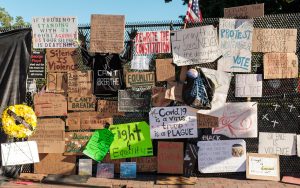Apocalypse Anymore?

No doubt the Trump presidency incited my Facing Apocalypse: Climate, Democracy and Other Last Chances. Finishing final revisions only weeks after the 2020 U.S. election, I was relieved as I went through it to realize how little of it was about him. He remains a garish symptom, not a prime mover, of the ecological and political crises the book contemplates. Still, amidst the verdancy of spring, with a decent, even promising, U.S. president in place, with at least the possibility of a green new deal, of real attention to racial and economic injustice, and of a post-pandemic near future—who needs the apocalypse?
We do. It’s more relevant than ever, if we take it at its word. As discussed a while back here on Counterpoint, apokalypsis means not the end of the world but the “unveiling,” the revealing, of both the peril and the potential of our world. Unless we are just “Biden our time” (my thanks to brilliant punster and theological librarian at Drew University, Dr. Jesse Mann) until the forces of reaction and extraction roar back like the Beasts of John’s Revelation, this is a time in which we might more clearly face those forces. To face them is to confront them: to better recognize them, the better to counter them.
Because the strategies of autocracy failed to prevail in the U.S., a certain breathing room has opened. The momentum of flagrant world-trumping has been interrupted. Possibilities for an actually just, a woke, a sustainable future tantalize. At the same time, the radical fragility both of the nation’s democracy and of the planet’s habitability is unveiled. If it is a moment of “last chances”—given the precarity of both democracy and of ecology—it offers itself also as a moment of real chances. To recognize the apocalyptic stakes is not to surrender to a deterministic slide toward doomsday or leap toward the New Jerusalem. Neither pessimism nor optimism, in their complacent and in their radical versions, answer to the moment.
In its original context, the prophecy of John of Patmos, author of the Book of Revelation, did not predict factual outcomes soon or late. He “dreamreads” (p. xiv) a beastly pattern of imperial power and global greed so entrenched as to be likely to keep repeating itself–for just too long. He saw the pattern already trending toward human and environmental cataclysm.
Revelation is an ancient text, denouncing in its coded symbols the Roman empire (Beasts of sea and land) and its economy (“Great Whore”). The book’s reverberation with the current situation does not invite certitude about any future. But it can foster meditation on the possibility of the collapse of civilization and its terrestrial habitability. By the same token the text vests with ancient sacrality a utopia of radical transformation. The great urban renewal of the New Jerusalem–with its de-imperialized multi-nationality, and its “clean water free for all to drink”–has also seeded its possibilities, not probabilities, deep within such a moment as ours.
So in our context—with George Floyd’s “I can’t breathe” echoing across the breathing room of the political moment, even internationally—what is revealing itself? Precisely because of the Democratic victory in the U.S., the anti-democratic forces are revealing themselves in force. They burst through in the January 6 riot (I’m not sure I want to dignify the mob action with the term “insurrection”).
The Republican party’s denial of the seriousness of the assault goes now hand in hand with strategies for thwarting both small and large “D” democratic process through new voter suppression laws and radical moves by Republican state legislatures to make it easier for them to refuse future election results if they don’t like them. (Do to you ever wonder if the double meaning of d/Democrat has weakened Republican buy-in?) We in the U.S. face the chance of state-by-Republican-state legal sabotage of the electoral process. Such a vast action may or may not succeed. But its intentions will proceed.
Perhaps such a reaction was predictable, given the long-growing nonwhite proportion of the U.S. population. Those on right or left too alienated from the electoral process to care may look away. But for those of us still giving a damn about democracy, there is no such re-veiling: the antidemocratic intentions have clearly revealed themselves precisely in response to the Democratic moment. In ironic apokalypsis: the better of today’s politics reveals the possibility of a future worse. In the politics of US, a white us-exceptionalism has always festered within this democracy. Indeed, it has been fueled by founding theopolitics of Manifest Destiny, of the Lord’s “chosen nation to finally lead in the redemption of the world” (p. 32). And now we face it working to twist itself into the sovereign exception to that democracy.
Apocalyptic ironies twist and turn in the present moment. The most encompassing of all is what Michael Hogue calls “the Anthropocene paradox.” The present era, in which, humanity, the Anthropos, counts as the major planetary geological force is also the time when our species’ sovereignty twists toward species suicide. It matters not, eco-geologically speaking, how few and how white are the perpetrators of this mass extinction that may—if unchecked—include most or all of us. But it does matter politically. So we are witnessing with the Biden administration an attempt to face this danger–and so to twist away from the worst consequences of climate change. In another apocalyptic irony of the Anthropocene: the worsening data provokes better response.
Biden’s climate plan was formulated quickly and strongly. With its clean electricity standard, it addresses also the need for jobs. Though with its combination of ecological and economic strategy it is popular across party lines, it faces united opposition from Republican leadership. Nonetheless, there is surprising potential for rapid shifts away from the deadly extractivism of the fossil fueled world. For instance, The New York Times recently reported, “In recent weeks, 13 publicly owned utilities announced support for an aggressive measure that would eliminate 80 percent of fossil fuel emissions from the sector by 2030.” Getting somewhere! And even more recently: “In what may be the most cataclysmic day so far for the traditional fossil-fuel industry, a remarkable set of shareholder votes and court rulings have scrambled the future of three of the world’s largest oil companies.”
And I was startled last week to learn that Ford’s most popular pick-up truck is about to go electric, apparently with such efficiency as to reach that enormous, largely rural and conservative public who purchase them. I do not expect redemptive greening from our auto industry and its dollar-green motives, but perhaps this is more apocalyptic irony.
The point is not that U.S. exceptionalism or global extractivism will disappear before they doom us. But there is the chance that as we take pause, take breath, take stock of our current eco-political reality, perhaps enough of the Anthropos will read the apocalypse of our moment. The interacting crises of democracy and climate come into revelatory relevance. They are lifted—releve’—into visibility from the normal surface of U.S. politics. What is more dire exposes itself in a more democratic moment. The apocalypse does not signify The End. Nor does it guarantee a New Beginning. Its utopia remains what activist scholar Dhawn Martin calls X-topia—“a place for the uncertain, the unfamiliar, the unforeseen..”
Amidst our masks and our unmasking, the fraught ancient future of Revelation gazes back at us in an irony of unveiling. The stakes are catastrophic enough to close us down in the very face of disclosure. Or to catalyze the needed metamorphosis.
#
Catherine Keller is George T. Cobb Professor of Constructive Theology in The Graduate Division of Religion of Drew University. She teaches and lectures across a broad spectrum of pluralist, ecofeminist, process, and political theology. Her books include From a Broken Web; Apocalypse Now & Then: a Feminist Approach to the End of the World; God & Power; Face of the Deep: a Theology of Becoming; On the Mystery; Cloud of the Impossible: Negative Theology and Planetary Entanglement; and Political Theology of the Earth: Our Planetary Emergency and the Struggle for a New Public. Just out: Facing Apocalypse: Climate, Democracy and Other Last Chances. She has co-edited several volumes of the Drew Transdisciplinary Theological Colloquium, most recently Entangled Worlds: Religion, Science and the New Materialism.
This Counterpoint blog may be reprinted with the following acknowledgement: “This article was published by Counterpoint Navigating Knowledge on 2 June 2021.”
The views and opinions expressed on this website, in its publications, and in comments made in response to the site and publications are those of the author(s) and do not necessarily reflect the views and opinions of Counterpoint: Navigating Knowledge, its founders, its staff, or any agent or institution affiliated with it, nor those of the institution(s) with which the author is affiliated. Counterpoint exists to promote vigorous debate within and across knowledge systems and therefore publishes a wide variety of views and opinions in the interests of open conversation and dialogue.



